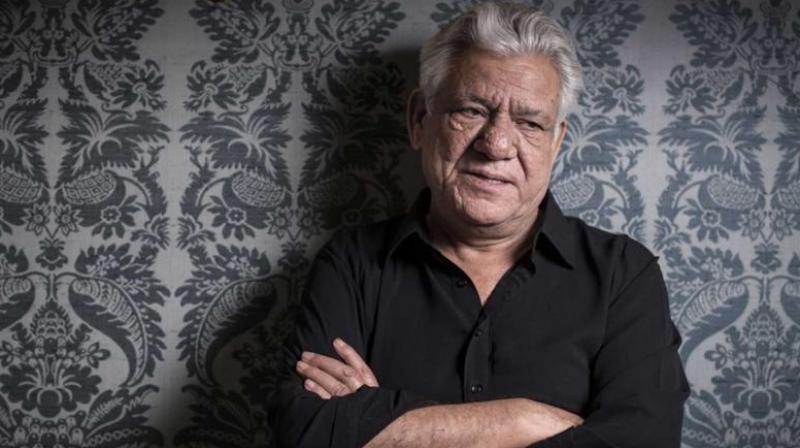Goodbye, Om Puri; Bollywood will shine a little less without you
Om owned up to his mistakes. He never lied to the camera. He never lied to himself.

When Om, or Omji as I insisted on calling him, came home with his friend and companion Seema Kapoor, he was not feeling well.
Excessive smoking had killed his taste buds. He couldn’t savour any of the food we served him for lunch. At the end of the two hours, Om promised he would take better care of his health.
He never did. Just recently he was in hospital with a cancer scare, and again he promised to stop smoking and cut down on his drinking.
But unhappy people need an outlet, some kind of numbing comfort for their soul, even artistes as steeped in brilliance as Om.
On hearing of his sudden death, I relived Om’s most glorious performances. The implosive anger he projected in his best parts in Govind Nihalani’s 'Aakrosh', 'Ardh Satya', 'Droh Kaal' and Shyam Benegal’s 'Arohan', 'Susaman', was squandered in the comedies he insisted on doing with Priyadarshan and David Dhawan.
With Om I could be as critical as I wished about his work. He would never take my comments amiss. Normally when actors ask for an honest opinion they don’t mean it. Om did. Each time I would see him in some frightful corny kitschy cringe-worthy potboiler with his belly hanging down to his knees, I would remind him he was the actor from 'My Son The Fanatic' and 'The Mystic Masseur' (the latter a loving delightful adaptation of V S Naipaul’s novel and one of Om’s unsung gems).
He would remind me of his financial responsibilities. “I’ve a son. He needs careful nurturing. I can’t just sit back and relax. My colleague Naseer’s children are grown up. His responsibilities are over. And besides he has earned a lot more than me. I’ve been paid peanuts for my efforts. I was paid a mere 7 lakh rupees for playing one of the central characters and working four months non-stop in Raj Kumar Santoshi’s 'China Gate'. I’m sure Naseer must’ve got five times more money for the same film. Surely big filmmakers like Santoshi Saab should be more cautious of my worth. But I’ve no complaints. I may return to theatre, or do a small but meaningful film that gives me satisfaction as an actor.”
Om was exhausted of his own prolific output and deeply embittered by his professional and personal conflicts.
In one of our most recent conversations he had said to me, “Enough is enough. I’ve slogged for thirty years. I’ve accumulated a decent bank balance, though it may not be decent by Bollywood standards. I’ve done roles for fun and for job satisfaction. Now I need to take it easy. I keep turning down offers. I need a break.”
The break has come so suddenly and unexpectedly. Friends like Naseeruddin Shah and Shabana Azmi are in a state of shock. The two actors together with Om formed the titanic triumvirate of non-mainstream actors who changed the way we look at cinema. While Naseer and Shabana have come to terms with their lack of fluency with commercial cinema, Om till the end remained torn between the two extremities represented by Shyam Benegal and David Dhawan.
The meager remuneration as compared with actors much less skilled who were stars, bothered Om.
“I am being used like a potato in every dish—be it a comedy, thriller or a love story. The bloody bhindi costs Rs 60 per kg. But the price of potato remains unchanged. I have to make my family and I financially secure. To a large extent, I’m already on the way to doing that. If today I decide to migrate to a small town, I don’t have to worry about my income. But I want a little more from my career. I do have certain ideas for films swimming in my head. Sometimes I feel being part of an escapist entertainer is just fine. At other times I feel like addressing myself to issues that bother me.”
He was a restless unhappy man who couldn’t lie to himself, trying till the end to find a peaceful ground in his personal life. The rage that imploded in his best performances often manifested in foot-in-the-mouth declarations on public platforms, like the one recently about our soldiers. Om repeatedly got into trouble with his unthinking sound bytes. He took the backlash on his chin like a man. But he wasn’t prepared for this one final blow that dealt his life on Thursday morning.
I will miss your gravelly voice on the phone as you spoke out on your personal and professional lives. In spite of my cleaning up some of the Puri pronouncements when it was published invariably got the actor into trouble. But he never denied his quotes, never said he was misquoted. Om owned up to his mistakes. That’s what made his performances so authentic. He never lied to the camera. He never lied to himself.

